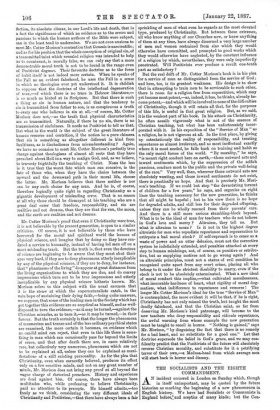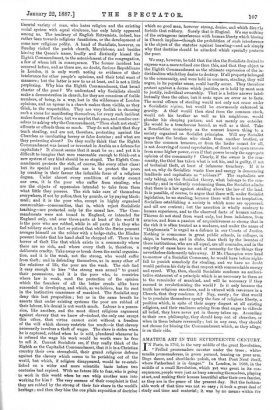TEE SOCIALISTS AND THE EIGHTH COMMANDMENT.
AN incident occurred in London on Sunday which, though in itself unimportant, may be quoted by the future historian as marking the beginning of a new phenomenon in English history. We have had Socialists or Communists in England before,'". and sceptics of many kinds; but the Con- tinental variety of man, who hates religion and the existing social system with equal virulence, has only lately appeared among us. The tendency of English Extremists, indeed, has rather been towards religions fanaticism, or the development of some new religions polity. A band of Socialists, however, on Sunday visited the parish church, llarylebone, and besides hissing the Queen's name, loudly and distinctly hissed the Eighth Commandment, to the astonishment of the congregation, a few of whom left in consequence. The former incident has occurred before, and as there are, no doubt, furious Republicans in London, it is only worth noting as evidence of their intolerance for other people's opinions, and their total want of manners ; but the latter is new to us at least, and is not a little perplexing. Why hiss the Eighth Commandment, that broad charter of the poor? We understand why Socialists should make a demonstration in church, for they are conscious of feeble numbers, of being, in a way, lost in the wilderness of London opinions, and an uproar in a church makes them visible, as they think, to the respectables. They are very foolish in choosing such a scene for manifesting themselves, for every such incident makes dozens of Tories; but we may let that pass, and confine our- selves to asking why the Commandment, "Thou shalt not steal," affronts or offends them so much. They do not admit that they teach stealing, and are not, therefore, protesting against the Churches as inculcating heresy or false doctrine ; and what are they protesting about P Do they really think that the Eighth Commandment was issued or invented in Arabia as a defence for capitalists? It almost seems that it must be so ; and yet it is difficult to imagine that men reasonable enough to think-out a new system of any kind should be so stupid. The Eighth Com- mandment protects the rich, of course, like every other class; but its special and peculiar use is to protect the poor, by creating in their favour the inflexible force of a religious dogma. Under almost every condition of society except our own, it is the poor, who suffer from stealing, who are the objects of oppression intended to take from them what little they possess. The rich take care of themselves everywhere, if not by police, then by guards, or by paying black- mail ; and it is the poor who, except in highly organised communities—communities, that is, which reject Socialistic teaching—are protected only by the moral law. The Com- mandments were not issued in England, or intended for England only, and over three-parts at least of the world it is the poor who are robbed, while in all parts it is they who feel robbery most, a fact so patent that while the Swiss peasant avenges himself on the robber with a hedge-stake, the Hindoo peasant insists that his hand shall be chopped off. There is no horror of theft like that which exists in a community where there are no rich, and where every theft is, therefore, a deliberate cruelty. Take away or break down the social organisa- tion, and it is the weak, not the strong, who would suffer from theft; and in defending themselves, as in many other of the relations of life, the poor are the weak. The rich find it easy enough to hire "the strong man armed" to guard their possessions, and it is the poor who, in countries where law is weak, need the protection of the opinion which the founders of all the better creeds alike have succeeded in developing, and which, as we believe, has its root in the instinctive conscience of mankind. The Socialist may deny this last proposition ; but as in the same breath he asserts that under existing systems the poor are robbed of their labour, his denial is not worth much. Labour is a posses- sion, like another, and the most direct religions argument against slavery that we know of—indeed, the only one except this other, that virtue cannot exist without a freedom of the will which slavery restricts too much—is that slavery necessarily involves a theft of wages. The slave is stolen when he is captured, robbed when he is sold, plundered whenever he is refused the wage his work would be worth were he free to sell it. Cannot Socialists see, if they really think of the Eighth as the Capitalist Commandment, that it is in a Christian country their own stronghold, their grand religions defence against the slavery which seems to be perishing out of the world, but which, if religion disappeared, would be re-estab- lished on a wider and more scientific basis before two centuries had expired. With no future life to fear, who is going
• to work in this world when he can whip another man into working for him ? The very essence of their complaint is that they are robbed by the strong of their fair share in the world's heritage ; and then they hiss the one plain exposition of doctrine
which no good man, however strong, denies, and which Erectly forbids that robbery. Surely that is illogical. We say nothing of the outrageous interference with human liberty which hissing in Church implies—though the prohibition of such interference is the object of the statutes against brawling—and ask simply why that doctrine should be attacked which specially protects the poor.
We may, however, be told that the idea the Socialists desired to express was a more refined one than this, and that they object ts the Eighth Commandment as the ultimate expression of the in- dividualism which they desire to destroy. If all property belonged to the community, and were held in common, stealing, they will argue, in its popular sense, could hardly occur. They therefore protest against a decree which justifies, or is held by most men to justify, individual ownership. That is a better answer intel- lectually than the other, but it rests upon an error as to facts. The moral offence of stealing would not only not cease under a Socialistic regime, but would be enormously enhanced in gravity. A thief would then steal from the common stock, would rob his brother as well as his neighbour, would plunder his sleeping partner, and not merely an outsider. He would be a treacherous hound, as well as a thief. Take a Benedictine monastery as the nearest known thing to a society organised on Socialist principles. Will any Socialist argue that the brother who steals from another brother, or from the common treasure, or from the larder meant for all, is not deserving of moral reprobation, of direct and open censure from some higher power, even if that power be only the aggregate opinion of the community ? Clearly, if the owner is the com- munity, the thief has taken what is not his, and is guilty, if not of technical theft, at least of infamous treachery. If it is not so, why do Socialists waste time and energy in denouncing landlords and capitalists as "robbers ?" The capitalists are only taking, on the Socialist theory, what belongs to the com- munity; and in violently condemning them, the Socialist admits that there is a law against stealing above the law of the land. It is possible, of course, to argue that there will, under Socialist legislation, be no stealing, because there will be no temptation,
Socialism establishing a society in which none are oppressed, and all are content ; but the assertion is wholly contrary to human experience, and to the observed facts of human nature.
Thieves do not steal from want only, but from indolence, from avarice, and from a passion of acquisitiveness so strong that in the rich it is often treated as a madness, and under the name of " kleptomania " is urged as a defence in our Courts of Justice. Nothing is commoner in great public schools, in colleges, in ships, in barracks, and in clubs, than theft by the inmates of those institutions, who are all equal, are all comrades, and in the majority of cases have no sort of necessity for the things they nevertheless dishonestly take away. If Mr. Champion were head to-morrow of a Socialist Commune, he would have before night- fall to punish somebody for stealing, and we have no doubt would perform his duty in that respect with commendable energy and speed. Why, then, should Socialists condemn an authori- tative statement of a principle which is as necessary to them as to the remainder of mankind, and will be necessary if they succeed in revolutionising the world P Is it only because the truth has religions sanctions, and is uttered with reverence in a Church, that they condemn it ? Nay, surely ; for that would be to proclaim themselves openly the foes of religious liberty, a position which, in spite of their angry disgust at all existing religions, and their readiness arising from that anger to ridicule all belief, they have never yet in theory taken up. According to their own philosophy, they should keep out of churches, or when in them behave reverently ; but in any case, they should not choose for hissing the Commandment which, as they allege, is on their side.



































 Previous page
Previous page